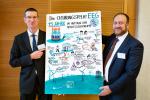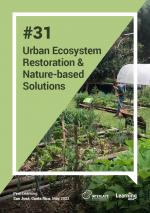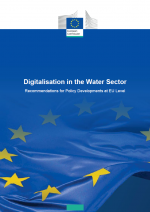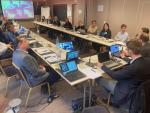Ecologic Institute Newsletter No 243 – December 2022
Clearingstelle EEG|KWKG
- Ecologic Institute Newsletter

Clearingstelle EEG|KWKG: 15 years of providing legal security for the energy transition
Dear reader,
The Clearingstelle EEG|KWKG is a unique institution in the German legal landscape. It clarifies technical and legal issues, settles disputes, and has thus become an essential center of competence for experts, plant operators, grid operators, and anyone looking for legal and technical expertise in the rapidly changing energy system. It is now celebrating its 15th anniversary.
The institution offers clarification on complicated matters in the energy sector regarding the Renewable Energy Sources Act (Erneuerbare-Energien-Gesetz, EEG), the Combined Heat and Power Act (Kraft-Wärme-Kopplungsgesetz, KWKG) and the Metering Point Operation Act (Messstellenbetriebsgesetz, MsbG) to save those affected from having to go to court. It arbitrates between the actors in the energy industry, that is, the plant and grid operators, direct marketers, and metering point operators. Between 2007 and 2022, the Clearingstelle received around 15,500 inquiries. Roughly three quarters relate to photovoltaic plants, followed by biomass (8%), CHP and wind (3% each) and water (2%).
The Clearingstelle provides equal access for everyone. Over the course of 15 years, the experts at the Clearingstelle have clarified, settled, and specified many technical and legal issues. Over 4,000 entries are listed in the Internet database on the homepage. This database is the largest freely accessible collection of legal cases on renewable energies and combined heat and power in Germany.
Ecologic Institute has played a pivotal role in launching the Clearingstelle in 2007. The operating company of the Clearingstelle is a 100% subsidiary of Ecologic Institute. Even though the Clearingstelle operates independently in terms of content, both are united in their mission to ensure the success of the energy transition.
Whenever you have questions concerning the EEG, KWKG or MsbG – please do not hesitate to contact us!
Dr. iur. Martin Winkler
Scientific Director of the "Clearingstelle EEG|KWKG" and Managing Director of RELAW GmbH
Ass. iur. Sonja Kahl
Researcher of the "Clearingstelle EEG|KWKG"
Alternatives to Synthetic Chemical Pesticides in Agriculture – Report
The study by Ecologic Institute provides scientific input for the discussion on more environmentally friendly crop protection in the future. It provides an overview of the potentials and barriers associated with alternatives to synthetic chemical pesticides, as well as approaches on the implementation of integrated pest management that have so far been given too little consideration. The study is available for download.
The Role of Ecosystem Restoration for the UNFCCC and the Paris Agreement – Policy Brief
Based on the policy developments and scientific findings, this paper provides an overview of the role of ecosystem restoration for the UNFCCC and the Paris Agreement. It outlines a policy context that considers the evolution of restoration activities and their importance in different elements of the Convention, maps them on a timescale, and focuses particularly on Nationally Determined Contributions (NDCs). Ecologic Institute's Gregory Fuchs and Rebecca Noebel provide policy recommendations to realize the adaptation potential of restoration. The policy brief has been included as an input for the German delegation in preparation for the COP27 climate negotiations in Sharm El Sheikh (Egypt) and is available for download.
Urban Ecosystem Restoration & Nature-based Solutions – Peer Learning Note
Restorative nature-based solutions, such as the restoration of wetlands and rivers, can help tackle challenges such as biodiversity loss, social inequity and climate change in cities around the world. United Cities and Local Governments (UCLG), together with several other partners of the INTERLACE project, published a Peer Learning Note on the potential of urban ecosystem restoration and nature-based solutions. The Peer Learning Note seeks to share practices and lessons learned. It provides good practice examples from different cities and peri-urban areas in Costa Rica, Ecuador, Spain and Colombia on how to integrate nature in the search for a more inclusive, sustainable and resilient urban development. The Peer Learning Note, available in English and Spanish, is targeted at cities, local and regional governments, communities and organizations worldwide.
Limitations of Stakeholder and Public Engagement in Bioeconomy Strategy Development Processes – Book Section
A democratic dialogue with a broad spectrum of stakeholders and society at large is considered necessary for the transformation to a sustainable bio-based economy. As such, several dedicated bioeconomy strategies across Europe and beyond outline objectives towards broader stakeholder and public engagement. In the book chapter "Limitations of Stakeholder and Public Engagement in Bioeconomy Strategy Development Processes" in "Zukünfte nachhaltiger Bioökonomie", Dr. Zoritza Kiresiewa, Laurens Duin and Holger Gerdes address the degree of participation and the role of the individual actor groups and society in strategy development processes and recommend concrete actions for more inclusive and effective stakeholder and public engagement. The publication is available online.
Long-term Strategies: state of play, challenges and possible support through the G20 – Policy Brief
Drawing on existing experience from across the globe, this policy brief provides an overview of the process of developing a long-term strategy (LTS) and its challenges, examines the support available for countries undergoing this process and presents some ideas on how the G20 could raise the political profile of the strategies. It has been included as input into the T20 process preceding the 2022 summit. The policy brief by Isabel Haase and Matthias Duwe (Ecologic Institute) is available for download.
What Can the EU Learn from Non-EU Countries on its Path to Climate Neutrality? – Policy Brief
This policy brief summarizes the results of 17 case studies of non-EU countries. It presents the main lessons and takeaways for the EU along the four challenges that define the 4i-TRACTION project: facilitating integration across sectors, shifting investments, rolling out infrastructure and fostering innovation for a climate-neutral economy. The policy brief is available for download.
Opportunities for Health Engagement in European Climate Policies – Study
This study, produced jointly by Ecologic Institute and IEEP for the European Public Health Alliance (EPHA), scopes 20 EU policy documents focused on adaptation, biodiversity, water, waste, mobility, and cross-cutting topics to analyze their treatment of health in the broader context of climate mitigation and adaptation policy. The purpose was to assess their integration of health-related concepts in order to identify gaps and opportunities, as well as provide recommendations for further advocacy for the health community. The study is available for download.
Digitalisation in the Water Sector: Recommendations for Policy Developments at EU Level – Policy Brief
This policy brief prepared by Dr. Ulf Stein and Benedict Bueb from Ecologic Institute together with other European experts was published by the European Commission. It provides an overview of current gaps in the EU legislative framework that hinder the realization of the benefits of digitalization in the water sector and offers concrete recommendations on how to overcome them. The policy brief is available for download.
German Environmental Policy Since 1971 – Study
51 years ago, on 14 October 1971, the Federal Government's Environmental Programme was adopted and has lost none of its relevance to this day. On the occasion of the conclusion of the contemporary historical study on German environmental policy since 1971 conducted by Ecologic Institute, an exciting analysis is now available.
Shaping EU Climate and Energy Policy: Insights from and for the Ariadne Project – Event Series
With the Fit-for-55 package about to be put into law, and the RePowerEU plan adopted in response to the energy crisis, EU climate and energy are undergoing the most profound change in years, getting the EU on track to a post-fossil energy system. In a three-day series of events, partners from the Ariadne research project presented key insights from their work that is relevant for the further development of EU climate and energy policy, and discussed these with representatives from political institutions, academia, civil society and business. The events served to share research insights, to discuss and validate findings and their relevance for EU policy process, and to gather inputs for further research. The event documentation is available online.
Government Draft of a Hessian State Climate Act – Expert Hearing
On 23 November 2022, Dr. Stephan Sina, Senior Fellow at Ecologic Institute, participated as an expert in a hearing of the Hessian State Parliament's Committee for Environment, Climate Protection, Agriculture and Consumer Protection on the government draft of a Hessian Act on the Promotion of Climate Protection and Adaptation to the Consequences of Climate Change. Together with about 40 associations and experts, he commented on the draft law and answered questions from members of parliament. The written statement is available for download.
Policy Instruments to Promote Implementation of Nature-based Solutions – Speech
Ewa Iwaszuk, a Fellow at Ecologic Institute, held a presentation titled "Policy instruments to promote implementation of nature-based solutions" at a side event called "Nature-based solutions for building performance" during the global climate conference COP27 in Sharm-el-Sheikh (Egypt). Ewa's presentation made the case that policy instruments and their governance act as critical enablers or barriers to the adoption of nature-based solutions. She presented the Urban Governance Atlas that Ecologic Institute is currently developing within the framework of the INTERLACE project and discussed good practice examples of policy instruments from around the world that support the implementation of nature-based solutions at a building level. A recording of the event is available online.
Green Deal – Big Deal for Youth? – Webinar
How has youth activism shaped the European Green Deal? And what role does the plan play for young people and future generations? In November, Ecologic Institute kickstarted a new webinar series for young people. The participants engaged in a discussion with climate communication expert Adam Wallin and Stefan De Keersmaecker, Coordinating Spokesperson for the European Green Deal from the European Commission. The experts' presentations are available online.
Ecologic Institute Accompanies School Classes within the Plastic Pirates Campaign
In October 2022, Mandy Hinzmann and Doris Knoblauch (both Ecologic Institute) each accompanied a school class as part of Plastic Pirates, a citizen science campaign to collect data on (plastic) waste pollution in rivers. The students take on the role of scientists and collect, sort and catalogue litter according to scientific methods. The results are checked and incorporated into a large study. The results of the citizen science campaign, which is now taking place not only in Germany but throughout Europe, are published on the Plastic Pirates – Go Europe! website.
Graduate with Expertise in the Economics of Climate Policy
Ecologic Institute's team of economists looks forward to welcoming you as a graduate with a focus on economic issues related to climate and energy policy.
Fellow with Expertise in Energy Policy
If you are an expert in energy economics and energy policy, the Energy Team of Ecologic Institute is looking forward to meeting you.
Student Assistant in the Field of Plastic and Urban Governance
Ecologic Institute is pleased to receive your application for the position as a Student Assistant in the field of plastic and urban governance.
HR Specialist /Administrator
The human resources department of Ecologic Institute consists of three dedicated women representing three generations. We are looking for someone equally dedicated to strengthen our team and help us with a variety of small – and sometimes larger – administrative tasks.
Contents
- Publications
- Alternatives to Synthetic Chemical Pesticides in Agriculture – Report
- The Role of Ecosystem Restoration for the UNFCCC and the Paris Agreement – Policy Brief
- Urban Ecosystem Restoration & Nature-based Solutions – Peer Learning Note
- Limitations of Stakeholder and Public Engagement in Bioeconomy Strategy Development Processes – Book Section
- Long-term Strategies: state of play, challenges and possible support through the G20 – Policy Brief
- What Can the EU Learn from Non-EU Countries on its Path to Climate Neutrality? – Policy Brief
- Opportunities for Health Engagement in European Climate Policies – Study
- Digitalisation in the Water Sector: Recommendations for Policy Developments at EU Level – Policy Brief
- German Environmental Policy Since 1971 – Study
- Presentations & Events
- Shaping EU Climate and Energy Policy: Insights from and for the Ariadne Project – Event Series
- Government Draft of a Hessian State Climate Act – Expert Hearing
- Policy Instruments to Promote Implementation of Nature-based Solutions – Speech
- Green Deal – Big Deal for Youth? – Webinar
- News
- Ecologic Institute Accompanies School Classes within the Plastic Pirates Campaign
- We are Hiring!
- Graduate with Expertise in the Economics of Climate Policy
- Fellow with Expertise in Energy Policy
- Student Assistant in the Field of Plastic and Urban Governance
- HR Specialist /Administrator





